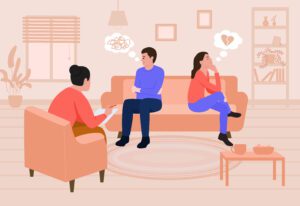How to Talk to Your Therapist When You Have Social Anxiety
This article has been researched and written by Nayla Daou. AI has not been used in producing this article.
Social anxiety disorder (SAD), also called a social phobia, is characterized by intense fear or anxiety of being negatively evaluated, judged, or rejected in a social situation. Individuals with social anxiety often limit their interaction with people outside of their close family and friends. While the degree to which social anxiety impacts an individual varies, it can become persistent, impacting daily life, self-esteem, and happiness. However, like other mental health disorders, social anxiety can be treated with psychotherapy and cognitive behavior therapy.
How Common is Social Anxiety?
While it’s not uncommon for someone with a social anxiety disorder to feel alone and misunderstood, social anxiety is very common. In fact, SAD impacts nearly 7% of the world’s population. While treatable, when left untreated, social anxiety can wreak havoc on those who suffer from it.
Social anxiety can range from mild to severe and can be triggered by many different situations. Common triggers for social anxiety may include:
- Dates
- Job interviews
- Parties and social gatherings
- Public speaking
- Business meetings
While most people experience social anxiety from time to time, this anxiety can become persistent and severe in some cases. Unmanaged social anxiety can make even the smallest social engagements uncomfortable and unpleasant. It can also make it challenging to form meaningful connections and relationships with other people.
Socially anxiety is generally categorized into two categories: non-generalized and generalized. An individual with non-generalized social anxiety does not experience social anxiety all of the time. Instead, specific types of social situations work as a trigger for their anxiety (such as a job interview or a first date). An individual with a generalized social anxiety disorder will avoid most social interactions. These individuals experience an overwhelming fear of negative judgment or rejection, which hinders their ability to engage socially.
Symptoms of Social Anxiety
Social anxiety goes beyond the occasional fear of interacting with others. Individuals with severe social anxiety worry that they will be judged by the people they interact with, and this fear keeps them from living their life to the fullest. Over time, this anxiety can manifest in physical symptoms to include shortness of breath, increased heart rate, faintness, excessive sweating, and shaking.
Individuals with social anxiety may also often experience anxious thoughts, such as “I won’t belong” or “No one will like me.” Many people with social anxiety often want to enjoy socializing with others and want to be included in social activities. However, their anxiety prevents them from doing so. Therapy can help an individual with SAD address the root cause of their social anxiety while providing them with tools and solutions to overcome their anxiety levels.
Social Anxiety and Therapy
It can be hard to open up to a psychologist or therapist when you have social anxiety. After all, therapy is a social experience, which is the very thing that activates social anxiety. Individuals with a social anxiety disorder may initially find it difficult to trust their therapist or open up during their sessions. They may also find it challenging to appear vulnerable for fear of being judged or rejected.
Like with any other relationship, you need to give it time. Although it can be hard to imagine, over time, patients become more comfortable with their therapists. When you find the right therapist, you will begin to trust them enough to open up about your life honestly, and while you may experience social anxiety.
Clearminds
Social anxiety disorder can be a profoundly frustrating and painful condition, but it’s also a treatable one. With the right therapies delivered in a supportive and safe environment, you can develop the inner resources needed to restore functionality, enhance your confidence, and create your life.
Clearminds offers a comprehensive approach for individuals grappling with mental health disorders. Contact a team member to learn more about how our psychology counselling services can help you or your loved one start on the path to lasting wellness.
How Psychoeducational Assessments Help Shape Better Learning Plans in School
No two children are the same. Every child brings a unique mix of strengths, challenges, and ways of …
Can Relationship Counseling Work for Toxic Relationships?
Relationships can be complicated, emotional, and at times, painful. While every couple experiences ups and downs, some relationships …
10 Signs You May Have Anxiety
Anxiety is a normal and natural human response to stress, danger, or uncertainty. However, when anxiety becomes excessive, it can …
Child Sleepwalking and Talking: What You Need to Know
Childhood is a time of rapid development, filled with new experiences—and sometimes, surprising nighttime behaviors.
Questions a Child Psychologist Might Ask
When preparing for your child’s first appointment with a psychologist, it’s natural to feel curious—or even a little anxious—about what …
55 Love Questions for Couples to Deepen Your Relationship
In any relationship, communication is key. Whether you’re just starting out or have been together for years, asking meaningful
Stress vs. Anxiety vs. Burnout: How to Recognize the Difference
In today’s fast-paced world, understanding the differences between stress, anxiety, and burnout is crucial for …
Relocation Depression: Definition and Ways to Cope
Relocation depression, also known as moving depression, is a form of situational depression that arises from the stress …
How to Help Your Child with Anxiety Through Divorce
Divorce is a significant change that affects every member of a family. For children, the uncertainty and adjustments …
Depression vs Sadness: Understanding the Difference
While often used interchangeably, the terms “sadness” and “depression” represent distinct emotional states, each with …











